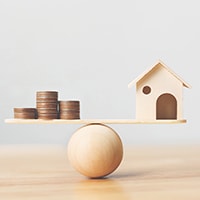When it comes to planning to sell your home, there are quite a large number of factors that come into play. You want a maximum amount when selling – as you have spent a long time doing renovations and created a lot of memories in the space. Before you start contacting a few real estate agencies in the area, take a moment to consider how valuable the house may be. There are several factors that can have an impact on the value of a home – some of these factors are controllable. Thus, by understanding how value is affected, you could possibly end up getting a better deal.
1. The Neighborhood
One of the first things to consider when trying to put a price on your home is the neighborhood. In fact, neighborhoods can have a bigger impact on value than many people realize. In one report, it was found that more than 50% of home buyers consider the neighborhood just as important as the actual house.
This is, unfortunately, a factor that you do not have control about. You have been living in the neighborhood for years and cannot change the neighborhood without moving to a different home. Consider the average home values in your neighborhood, as this will give you a good indication of what you can expect when selling your own house.
2. Size
The size of your house will also play a major role in the determination of cost and value. Larger homes obviously fetch higher prices. Thus, when you are trying to consider a price for your home, do take the size of the building into consideration. Take note of whether the house only has a single level or rather multiple stories – as added layers at the top create a bigger home that will generally also be linked to greater value.
3. Usable Space
While the size of the house is an important factor, you should also consider how much usable space there is. Just because a house looks big does not necessarily guarantee that it has a more significant amount of usable space. Consider usable space not only inside the house itself but also around the building. A big backyard can drive the value of a home upward, for example.
4. Condition
The condition of your home is another critical factor to take into account. When someone is looking to buy your home, they do not want to spend too much extra on renovations and repairing common problems. Thus, before selling, it is a good idea to do a thorough inspection of the building and the yard. This will help you identify problems that are easy to fix. By fixing these problems, you are improving the overall condition of the house – and this drives more value to the property you might be looking to sell.
Consider factors like the roof – leaks are often an easy fix, but only if you take action early on. If the new owner needs to fix the leak themselves, they will likely give you a lower offer than what you expect, as they need to consider the costs for these repairs after the purchase goes through.
5. Upgrades
Do not overlook the role that simple upgrades could play in the value of your home. Take a closer look at all parts of your home. We already mentioned that any problems should be fixed, but this is not all you should look for. See if there are any areas that could be improved through a few upgrades. For example, if the roof is very old, installing a new roof gives you an upgrade that significantly adds to the price of the home. You can get a new roof installed for under $10,000 in most cases. This could become a rewarding investment in the end – as the right strategy could cause this new roof to drive up the value of the building more than what the upgrade cost you.
Sponsored Links (ads)
Conclusion
While there are many uncontrollable factors that affect the value of a home, some elements can be controlled. Take note of the factors that are causing your home’s value to decline and take appropriate action where possible. This would result in a higher selling price should you decide to sell in the future.



